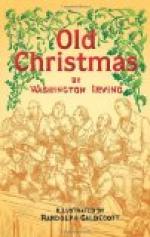The parson gave us a most erudite sermon on the rites and ceremonies of Christmas, and the propriety of observing it not merely as a day of thanksgiving, but of rejoicing; supporting the correctness of his opinions by the earliest usages of the Church, and enforcing them by the authorities of Theophilus of Cesarea, St. Cyprian, St. Chrysostom, St. Augustine, and a cloud more of Saints and Fathers, from whom he made copious quotations. I was a little at a loss to perceive the necessity of such a mighty array of forces to maintain a point which no one present seemed inclined to dispute; but I soon found that the good man had a legion of ideal adversaries to contend with; having, in the course of his researches on the subject of Christmas, got completely embroiled in the sectarian controversies of the Revolution, when the Puritans made such a fierce assault upon the ceremonies of the Church, and poor old Christmas was driven out of the land by proclamation of Parliament.* The worthy parson lived but with times past, and knew but a little of the present.
[3] See Note C.
Shut up among worm-eaten tomes in the retirement of his antiquated little study, the pages of old times were to him as the gazettes of the day; while the era of the Revolution was mere modern history. He forgot that nearly two centuries had elapsed since the fiery persecution of poor mince-pie throughout the land; when plum-porridge was denounced as “mere popery,” and roast beef as antichristian; and that Christmas had been brought in again triumphantly with the merry court of King Charles at the Restoration. He kindled into warmth with the ardour of his contest, and the host of imaginary foes with whom he had to combat; had a stubborn conflict with old Prynne and two or three other forgotten champions of the Round-heads, on the subject of Christmas festivity; and concluded by urging his hearers, in the most solemn and affecting manner, to stand to the traditionary customs of their fathers, and feast and make merry on this joyful anniversary of the Church.
I have seldom known a sermon attended apparently with more immediate effects; for, on leaving the church, the congregation seemed one and all possessed with the gaiety of spirit so earnestly enjoined by their pastor. The elder folks gathered in knots in the churchyard, greeting and shaking hands; and the children ran about crying, Ule! Ule! and repeating some uncouth rhymes,* which the parson, who had joined us, informed me had been handed down from days of yore. The villagers doffed their hats to the Squire as he passed, giving him the good wishes of the season with every appearance of heartfelt sincerity, and were invited by him to the Hall, to take something to keep out the cold of the weather; and I heard blessings uttered by several of the poor, which convinced me that, in the midst of his enjoyments, the worthy old cavalier had not forgotten the true Christmas virtue of charity.




